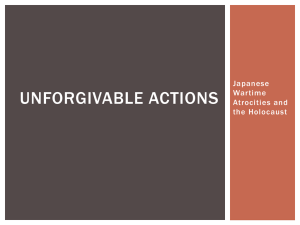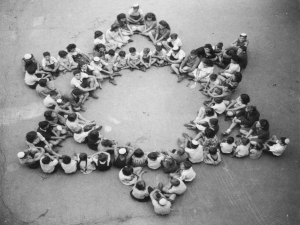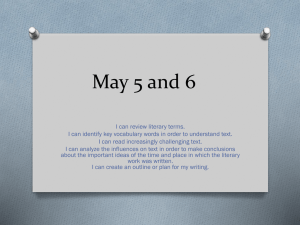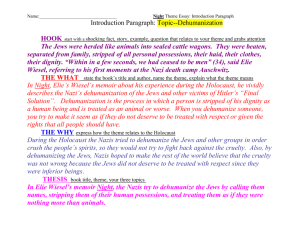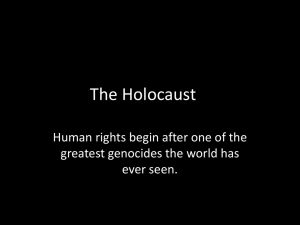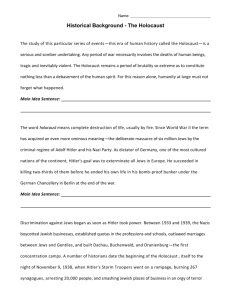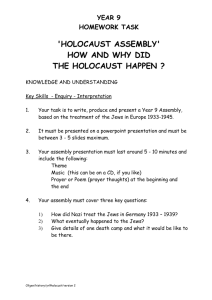Night - Insight Publications
advertisement
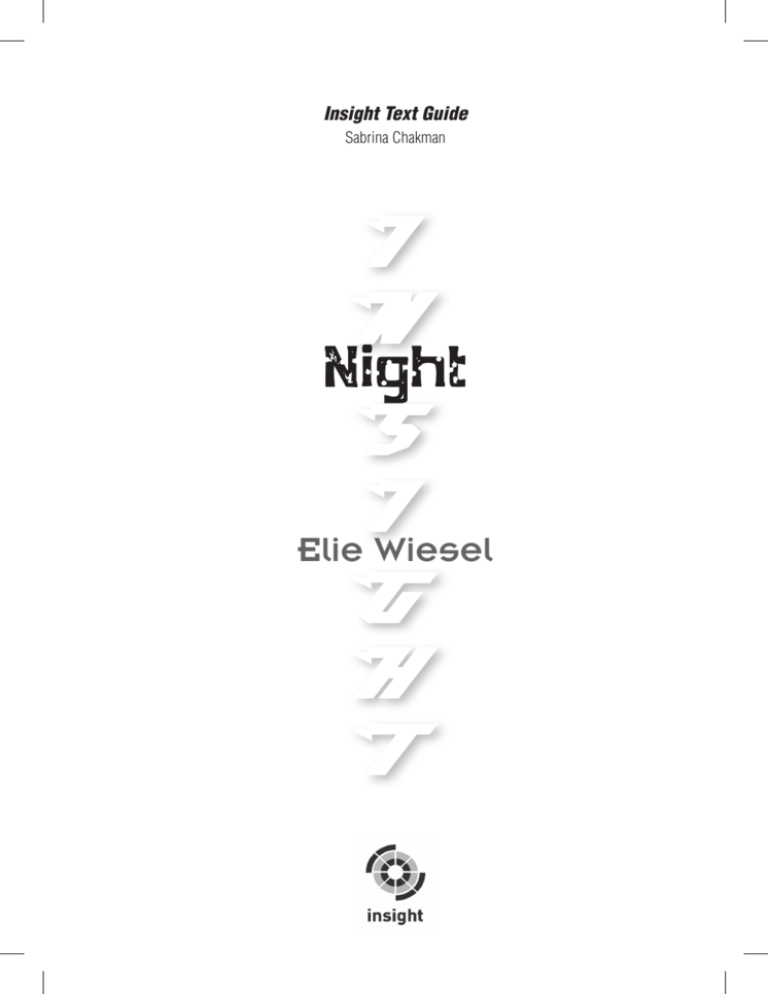
Insight Text Guide Sabrina Chakman Night Elie Wiesel contents Character map iv Introduction 1 Context & background 3 Genre, style & structure 16 Chapter-by-chapter analysis 23 Characters & relationships 38 Themes, ideas & values 47 Questions & answers 53 Sample answers 60 References & reading 66 Glossary 67 iv In s i g h t T e x t G u i d e character map Sarah Chlomo Mother of Elie, Hilda, Béa and Tzipora. Gassed and cremated at AuschwitzBirkenau Father of Elie, Hilda, Béa and Tzipora. Sent to the concentration camps with Elie. Dies shortly before liberation. married to torments son of Tzipora Franek Elie Elie’s younger sister,.Gassed and cremated at AuschwitzBirkenau with her mother. brother of Main character and narrator. Sensitive boy, sent to concentration camps from age 12–15. Survives. respects examines friends with Moché the Beadle Elie’s spirtual guide. Warns the jews of Sighet about the approaching disaster. torments brother of Initially friendly foreman, who quickly becomes brutal towards Elie and his father. Hilda and Béa Elie’s older sisters; survive the camps. Tibi and Yossi Dr. Josef Mengele Sadistic SS Officer who tortures prisoners and preforms cruel medical experiments. Twins who befriend Elie at Buna. 1 IntroductIon It was an interview with François Mauriac, the famous French Catholic writer (who wrote the foreword to Night), that inspired Elie Wiesel to tell the story of the horror he suffered and witnessed as a teenager in the infamous Nazi concentration camps. A fairly typical response to trauma is that people do not want to talk about their experiences. Wiesel was one of them, but he was helped to see that he could work for the benefit of humanity in writing his autobiography. Wiesel is now a famous and tireless advocate for human rights and a university professor who has established the Elie Wiesel Foundation for Humanity. He has written more than forty books and has won numerous awards for his work for human rights. Important dates in Wiesel’s life 1928 – Born 30 September in Sighet, Romania (pre-war Hungary). Note: Wiesel says that Sighet is a ‘little town in Transylvania’; the book cover refers to it as Hungary but in the blurb about the author it is in Romania. The Hungarian police have jurisdiction over Sighet rather than the Romanian police as you might expect. The explanation for this apparent confusion is that Transylvania is a region of Romania; Romania belonged to Hungary until 1947. 1944 – Deported by the Nazis to Birkenau and Auschwitz, then transported to Buchenwald. 1945 – Father dies in Buchenwald, 28 January. 1945 – Elie liberated from the camp,11 April. Lives in French orphanage. 1948 – Begins study at the Sorbonne in Paris. 1954 – Decides to tell his story after interview with François Mauriac. 1958 – Night published. 1963 – Becomes a citizen of the USA. 1972 – Serves as Distinguished Professor of Judaic Studies at City University, New York. 2 1976 – Becomes the Andrew W. Mellon Professor in the Humanities at Boston University. 1978 – Appointed chairman of the President’s Commission on the Holocaust by US President Carter. 1980 – Becomes the Founding Chairman of the USA Holocaust Memorial Council. 1986 – Wins Nobel Prize for Peace and subsequently establishes the Elie Wiesel Foundation for Humanity. 3 contEXt & BAcKGround Adolf Hitler (1889–1945) Born in Austria, Hitler became the leader of a fanatically nationalistic (and racist) political party called the National Socialist German Workers’ Party (Nazi Party) soon after the end of World War I in which he served. In 1923 he led a group of ex-servicemen and thugs in an attempt to overthrow the government of Bavaria (a state in Germany) for which he was imprisoned. In gaol he wrote Mein Kampf (My Battle/Struggle) which expressed his philosophy of so-called ‘Aryan’ superiority and Jewish inferiority; the hallmark of his regime was his passionate anti-Semitism. Through political intrigue and blackmail, Hitler became the chancellor of Germany in 1933, and rapidly dismantled the democratic structures, turning Germany into a totalitarian state. In 1934 he appointed himself the Führer (supreme leader) of the so-called ‘Third Reich’ (Third Empire) which he believed would last a thousand years! He re-occupied the Rhineland in 1936, annexed (incorporated into Germany) Austria and Czechoslovakia in 1938, and invaded Poland in 1939. This last led to the declaration of war (World War II: 1939–45) by the Allies. During his period in power, Hitler ordered the establishment of concentration camps expressly for the extermination of Jews and other ethnic and political groups he called subhuman or enemies of Nazism. In 1945, with Germany close to surrender, Hitler committed suicide, thus avoiding capture and trial by the Allied forces. Nazism in Germany Hitler founded the Nazi party in 1921 with just a few hundred members. The economic depression in Germany after the World War I (1914–18) particularly during the 1920s and 1930s, and Hitler’s personal charisma, led to the rapid growth of its membership. Although the Nazis never won an absolute majority of the vote in a democratic election, in July 1932 they won more votes than any other party in Germany. 4 In 1933 the Nazis declared a national boycott of all Jewish-owned shops. Jews who did not wear the yellow star were subject to execution. In 1935 Hitler escalated his anti-Jewish policies: the Nuremberg Laws deprived Jews of German citizenship, and sexual relations and marriages between Jews and non-Jews were declared illegal. Later it became illegal for non-Jews to work for Jews and for Jews to study with non-Jews. Jews were also banned from a number of professions. On 10 November 1938, discriminatory policy changed to wholesale violence in a pogrom which has become known as Kristallnacht – the night of the broken glass. The windows of almost every synagogue and of Jewish businesses were shattered; 91 Jews were murdered and 30,000 were arrested and sent to concentration camps where many died. How Hitler isolated the Jews One of Hitler’s tactics was to establish ghettos using the SS to round up Jews, forcing them to leave their homes and crowd together in the poorest part of their towns. They were required to relinquish valuables, they were subject to curfews, and they lost their independence and social standing. Jews in high profile jobs, for example in the government and universities, were dismissed without warning. The yellow star they were forced to wear at all times made them easy targets for the Germans. Jewish history Jews have lived in Europe for at least two thousand years and by World War II they were very much part of German society. However, an examination of Jewish history tells us this was not the first time they had been turned against by friends and neighbours. The Jews originated from nomadic Semitic tribes who lived in the Middle East and have a known history that goes back probably 4000 years. The Old Testament of the Bible is really a history of these early Jews and includes the story of Abraham who converted his tribe to the belief of a monotheistic God (a belief that there is only one god) at a time in history when people worshipped many gods often in the form of objects or animals. Later, according to the Old Testament, the Jews were Nigh t forced to flee Egypt, where many had settled, to escape the persecution that resulted from holding different religious beliefs from the rest of the population. In the last 2000 years, Jews have lived all over the Middle East and throughout Europe, and have suffered ongoing persecution. For example, in 170 BC in Syria, under a Greek ruler, Jews were massacred for refusing to worship Greek gods. In 1290, Jews were because they were said, wrongly, to perform ritual murder. In 1394, all Jews were expelled from France. In 1492, Spanish Jews were massacred or driven out. In Russia, Jews were massacred in pogroms throughout the nineteenth century. Jewish identity The question of whether Jews are a race, a religion or a culture has no simple answer. Jews identify themselves as being Jewish even if they are not religious, and Jews come from many different countries. The answer to what being Jewish really means is probably a mix of all of the above. For more detail read The Complete Idiot’s Guide to Jewish History and Culture by Rabbi Benjamin Blech. Don’t be offended by the title – the author is conforming to the other titles used in a series of books, which are usually computer manuals, such as The Complete Idiot’s Guide to Networking Your Home. The style of the books is humorous and the author assumes no prior knowledge. He leads readers through information in a user-friendly, but not condescending, fashion. Jewish religion and Holydays Judaism is based on the study of the Torah and the Talmud. Family is central to religious life and religious observance is expressed through High Holyday festivals, often culminating in feasts and celebrations. In Night, Wiesel mentions: • Shabbat, the Sabbath, which begins on Friday evening with the appearance of the first star in the sky and ends on Saturday evening. Jews are not supposed to work on the Sabbath, which in modern times includes driving a car and turning on power. 5 6 • Pesach (Passover), which commemorates the escape of the Jews from slavery in Egypt. • Rosh Hashanah, the Jewish New Year (the Hebrew calendar differs from the Christian one). • Yom Kippur, which is the Day of Atonement when Jews ask for God’s forgiveness of their sins. Jewish practices • Kashrut – Jews are required to observe dietary laws, called kashrut, which include keeping meat and milk separate. • Kosher – Food is kosher if it is prepared according to practices based on laws regarding food preparation (kashrut) that are in the Torah. This includes a way of slaughtering animals for meat that follows a prescribed procedure which is considered to be more humane. Adolf Hitler and the ‘Final Solution’ WWII began on 3 September 1939, following the rise of the Nazi Party and Hitler’s drive to take over Europe to create what he called the ‘Third Reich’, which was to be a new era led by Germany. Hitler’s plan to exterminate the Jews of Europe, as well as other ‘undesirables’ or opponents, was what he euphemistically called the ‘Final Solution’ (to the Jewish question). He used the well-established pattern of anti-Jewish sentiment (this became anti-Semitism on racial, rather than strictly religious, grounds) to gather support for his idea that Germans (whom he termed ‘Aryans’) were the Master Race. Aryans were, in fact, never the blue-eyed, blond Germans as the Nazis claimed. Historians believe they are probably an ancient people who spread from what is now Iran and Iraq, across the region from India through to Eastern Europe. Nevertheless, Hitler believed he should cleanse the world of inferior groups. He attributed Germany’s economic and political troubles, including Communism which he labelled a Jewish conspiracy, to the Jews. He masterminded heinous (abominable) procedures to carry out his ‘final solution’. Nigh t Why didn’t Jews flee? In Night, we see the Jewish people responding to the news of threats to their well-being in ways that may seem strange to us. The question of why they did not immediately pack up and flee their homes is often raised. The answer, in part, lies in the history of persecution that the Jews have suffered from the time they chose to be monotheistic (believing in one God). The experience of being outsiders and suffering persecution was a recurring one. The tragedy of what happened in Nazi Germany was that, for a time, Jews had felt quite secure and had, perhaps, dropped their guard. It can also be argued that Jews were very reluctant to move away from established centres because of the close nature of their community involvement and worship, which relied on access to a synagogue and services, such as kosher food. Another very practical reason was Germany and the other occupied countries prior to and during the war. However most countries, including Australia, closed their doors, letting only a small number of people in (often only children) even after their governments knew of the death camps. One of the reasons that Elie’s father and many of the Jews in his town did not believe the warnings of Moché the Beadle was that Germany was such a cultured and civilised country. Many Jews were so assimilated that they considered themselves German before anything else, even before their Jewish identity. They simply could not believe that mad acts of brutality and hatred that occurred during Hitler’s regime could come from their neighbours and friends. There are several references in Night to the Jews’ disbelief of the stories they heard about the Holocaust. They did not believe those things could happen ‘in the middle of the twentieth century!’ (p.19), despite the events in Germany. Elie’s father says he is too old to pack up and start again in a new country; others can’t believe the Germans could be so cruel. Some Jews doubted Hitler’s ability to wipe out a whole people who were scattered all over Europe – there seemed to be a desire to believe only the best about people. Perhaps it was a collective exhaustion and a group refusal to countenance history repeating itself. 7


